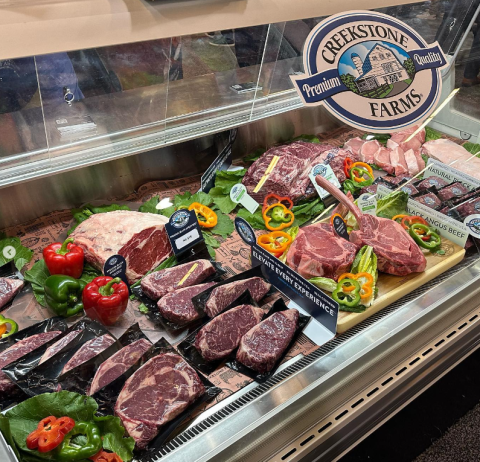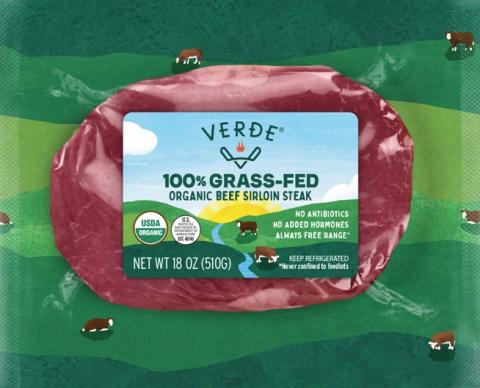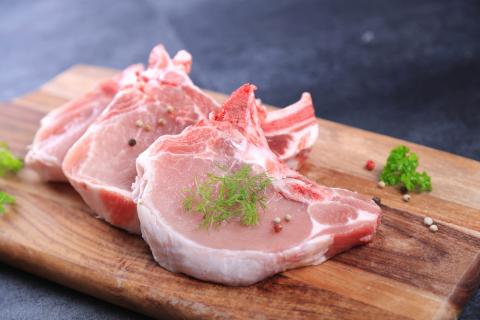Consumers Willing to Pay More for Premium Meat

As battered by inflation as shoppers may be, not everyone is trading down to value cuts. In fact, many consumers are paying for premium proteins that meet their taste and lifestyle preferences.
Akin to the adage about not putting a price on happiness, there’s a higher ceiling for meat products that are bought for the eating experience and, increasingly, for attributes that mirror personal values. The 2023 “Power of Meat” study, published by FMI — The Food Industry Association and the North American Meat Institute (NAMI), shows that although inflation is driving many decisions at the meat case, so are other factors. According to the report, 85% of meat consumers also take into account at least one of the considerations of health, animal welfare, planet or social responsibility when buying meat and poultry, a rate that has stayed consistent despite recent price spikes.
“There’s no hiding that the market outlook shows tough times ahead, with shrinking cattle supplies and changing consumer preferences,” asserts Jim Rogers, SVP at Arkansas City, Kan.-based Creekstone Farms. “However, this presents an opportunity to creatively balance innovation and investments. Items such as case-ready technology and transparent sustainability messaging will be vital to help retailers capture consumer demand for premium meat.”
Taking a closer look at the retail meat case, some attributes within the broader protein categories are faring well and reflect shoppers’ penchant for premium offerings.

Raising the Bar
One facet of shoppers’ interest in premium proteins is sourcing. How animals are raised, including the land on which they graze, what they eat and how they are cared for, is a consideration for many consumers as they’re weighing their selections at the meat case.
According to the latest “Power of Meat” study, four in 10 meat buyers cite aspects of animal living, feeding and care as part of their animal welfare considerations. More than half (58%) of consumers say that it would be helpful to have some kind of animal welfare ratings or certifications for the meat they purchase.
Meat brands and suppliers with such sourcing claims underscore this kind of value proposition. “People want to know where their products come from. They want to know that the animal and the people involved in growing their food are well taken care of and doing the right thing,” says Tom Windish, primary division managing director for Wichita, Kan.-based North America Cargill Protein, adding that the notion about shoppers’ willingness to pay extra may soon become moot. “That’s always the question when you do consumer research,” notes Windish. “People say it’s important, but what are they willing to pay for it? But we can’t wait for that to resolve — we have to move forward, and we know that it’s of bigger importance to younger consumers.”
Animal care extends to many aspects of production. For example, feed used to be a little-thought-of part of the ranch-to-table chain from a consumer standpoint, but today’s meat shoppers are learning more about animal feed and how it affects eating quality, nutrition and sustainability.
Take, for example, the interest in grass-fed beef that has continued to grow over the past few years. According to London-based research firm Technavio, the global market for grass-fed beef is estimated to grow by $12.15 billion from 2022 to 2027 as more brands enter this segment.
Indeed, the way animals are nourished has become a selling point for brands that connect with information-seeking consumers. Brandt Beef, part of the One World Beef Alliance, in Solana Beach, Calif., emphasizes the fact that its Holstein steers are raised within the organization and that the cattle feed is grown on 600 acres of adjacent land.
Going upstream a little more, species is another animal-based differentiator in premium products. Here, too, eating quality and stewardship are part of the dynamic behind the trend. In the pork category, some processors and retailers tout pork from the Duroc breed of hogs, known for its darker-red color and rich marbling. The Berkshire breed of pork has been compared to the Wagyu breed of cattle because of its heritage and associated tender and flavorful eating quality.
Beef species typically linked with elevated quality — and hence viewed as more premium — include breeds like Angus that have become common in restaurant menus and have migrated to the butcher counter and self-serve meat case. While Wagyu beef is typically associated with restaurant menus, some specialty meat departments carry those high-end cuts.
As they merchandise premium proteins with some type of breed claim, grocers can choose to add case-ready products or showcase items at their full-service counters as a way to elevate their offerings. Creekstone Farms, for example, offers a case-ready program for its Black Angus beef and all-natural Duroc pork. Meanwhile, True Story Foods, of Fairfield, Calif., offers a line of Berkshire pork, which it calls Kurobuta pork, to food retailers.

Shelling Out for Sustainability
In addition to animal-centric considerations, the overarching topic of sustainability has become a selling point for protein products that are considered premium. Many meat companies have staked a claim on different aspects of sustainability, including the use of resources for production, processing and packaging.
Some brands are upping the ante when it comes to sustainability claims. Mississauga, Ontario-based Maple Leaf Foods, for example, became a carbon-neutral company in 2019 by purchasing highly credible offsets to account for emissions not yet avoided, reduced or replaced.
“Consumers weren’t yet demanding that Maple Leaf go as far as it did with environmental measures, but we believe we had a responsibility to lead the change, not follow behind shifting public attitude,” explains Randy Huffman, the company’s chief food safety and sustainability officer.
Verde Farms, a Boston-based supplier that produces organic 100% grass-fed, 100% pasture-raised beef, recently relaunched its brand with an emphasis on its commitment to regenerative agriculture with new “Land to Market” verification.
Co-founder and CEO Dana Ehrlich suggests that sustainability claims need to be accompanied by education. “Regenerative is a great buzzword, but there are few who understand what it means,” notes Ehrlich. “We created a short video of our facilities to help explain it, because it’s our job to educate.” He adds that these practices result in higher soil quality, better water retention, healthier grass for feed, and improved animal grow rates and quality.
Underpinning sustainability claims, of course, is the ultimate driver of taste. “Organic consumers want a great eating experience as much as conventional consumers do,” Ehrlich points out.
Other processors are likewise redoubling their sustainability and transparency efforts. Springdale, Ark.-based Tyson Foods recently unveiled a Brazen Beef line, produced using 10% less greenhouse-gas emissions, as part of its Climate-Smart Beef program.
“As we take this step, we are focused on three things: climate friendly, grass- and grain-fed, and tracking every animal,” notes Kent Harrison, Tyson’s VP of fresh meats marketing and premium programs. “Those are the most critical things, and they are all on the label.”
Meanwhile, Cargill is making strides in its BeefUp initiative, which launched in 2019 to reduce greenhouse-gas emissions by 30% across its North American beef supply chain by 2030.
According to Windish, consumer insights conducted for Cargill show that people are interested in knowing more about sustainability actions and results. “We are starting to see sustainability in purchases slowly go up the list of attributes,” he notes. “It’s growing, and what’s really emerging is this holistic view. It’s not just about carbon sequestration.”
A Story to Tell
Tying together attributes that make a product premium in the eyes of shoppers, storytelling has become nearly as important as the item itself.
The brands that fall under the One World Beef umbrella, for example, highlight attributes such as breed type, feed and sustainability measures. Likewise, Tyson Foods shares more stories behind its products as a way to connect with information-seeking consumers. That includes storytelling for products in its new Brazen Beef line, as well as its Open Prairie and premium Chairman’s Reserve brands, among others.
Storytelling takes place across messaging platforms to reach shoppers who are browsing premium proteins. At the point of sale, packaging is a crucial method of delivering information, especially as smart-packaging technologies like QR codes advance. Processors and brands are also using a host of website and social media platforms to share why higher-priced products are worth the bump in price.
As meat suppliers focus on storytelling, grocers can share those stories in their physical and online stores as well. In addition to educating meat department staff — especially those at the butcher counters — about premium product features, grocers can leverage point-of-sale materials that link shoppers back to farmers and ranchers.
Austin, Texas-based Whole Foods Market, for instance, regularly shares information and resources related to its selection of Animal Welfare Certified local, organic and grass-fed proteins. Another example is Des Moines, Iowa-based Hy-Vee Inc., which has added video screens in some of its meat departments providing insights on its 100% natural Choice Reserve line and heralding the fact that only “6 out of 100 cattle make the cut” in accordance with its discerning standards.








